The Big Read in short: Digital addiction made worse by Covid-19
Each week, TODAY's long-running Big Read series delves into the trends and issues that matter. This week, we look at how the pandemic has worsened people’s reliance and addiction to digital devices. This is a shortened version of the full feature.
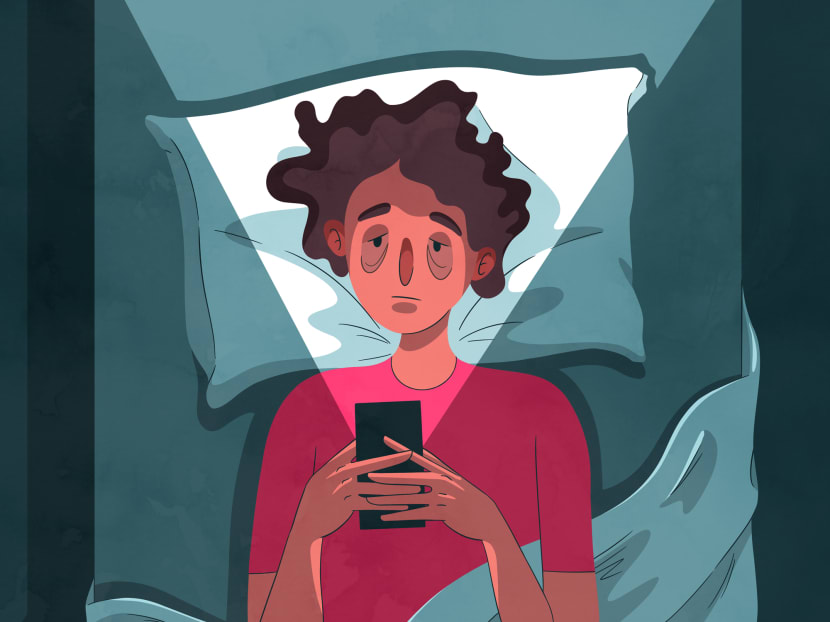
While the use of technology is helpful in helping people to connect during a time of isolation, there soon comes the problem of overdependence on technology, when people feel that “everything is being done online”.
Each week, TODAY's long-running Big Read series delves into the trends and issues that matter. This week, we look at how the pandemic has worsened people’s reliance and addiction to digital devices. This is a shortened version of the full feature, which can be found here.
- As Covid-19 pandemic accelerates the digitalisation of all aspects of people’s lives, it has also worsened their reliance and addiction to digital devices
- Be it for work, study, socialising or leisure, people are turning to their digital devices amid social distancing and other measures to curb the spread of the virus
- Adults and children alike are feeling the strain from staring at screens for most of their waking hours
- Experts say that negative effects such as impeded social skills, troubled sleep and dry eyes may result
- While there are practical steps to help reduce time spent on our screens, eliminating it totally is not an option, said the experts
SINGAPORE — When social media sites Instagram, Facebook and WhatsApp were temporarily down on Monday night (Oct 4), it was the first time in a long while that Xiu Ting, 23, managed to go to bed before midnight — without spending at least half an hour on her bed mindlessly scrolling through the sites, a common pre-bedtime ritual for countless people around the world.
“It helped me sleep earlier... I was quite happy to be honest,” she said, adding that she typically looks through her Facebook feed before she sleeps in order to “keep up to date with the news”.
While Monday night offered a temporary reprieve, Xiu Ting, who works at a tech firm, said that she engages in some form of screen time for most of her waking hours — a situation made worse by the pandemic as it accelerates the digitalisation of all aspects of people’s lives.
Working from home means that she would sometimes wake up at 7am “in a panic”, several hours before work begins, afraid that she may have missed messages from her colleagues.
Even during her lunch breaks, she anticipates messages from her colleagues who may have already finished their meals.
“I definitely did not do that when I was working in the office, because everyone will be eating lunch with you, so how can they text you?”
After work, she would speak to her boyfriend, whom she is in a long-distance relationship with, over a video calling app. Later in the evening, she would often watch shows on streaming app Netflix to wind down.
“It feels like I am on my phone (or screen) at every waking hour,” said Xiu Ting, who declined to give her full name.
The time which people — both young and old — spend looking at their screens, along with its ill-effects, has been on the rise here even before the Covid-19 pandemic struck early last year.
But the phenomenon has been exacerbated by the move towards working from home, and coupled with social distancing measures, more people are being pushed to interact online instead, according to those whom TODAY spoke to.
“In the wake of the circuit breaker last year, there was a sudden switch to online everything — online work, online home learning, online leisure (and) online socialising,” said Professor Lim Sun Sun, the head of Humanities, Arts and Social Sciences at the Singapore University of Technology and Design (SUTD).
While the use of technology is helpful in helping people to connect during a time of isolation, there soon comes the problem of overdependence on technology, when people feel that “everything is being done online”, said the researcher, who is also a professor of communication and technology.
The problem is not unique to Singapore, with various studies from abroad showing that there has been an increase in screen use among adults and children during the pandemic.
Anecdotally in Singapore, excessive screen use has led to a rise in the number of patients with symptoms related to their digital habits, said psychologists, psychiatrists and ophthalmologists whom TODAY spoke to.
For instance, Dr Lim Boon Leng, a psychiatrist at Dr BL Lim Centre for Psychological Wellness, said that compared to pre-pandemic days, he has seen in recent months a 10 per cent increase in patients coming in for conditions such as sleeping troubles, increased stress levels, and the inability to focus at work, all partly due to excessive screen usage.
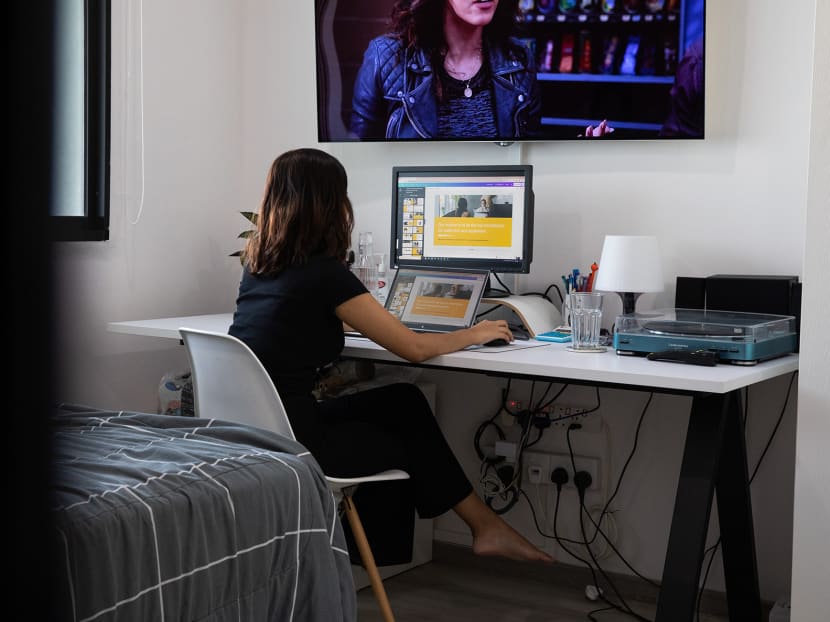
ILL EFFECTS
Such overdependence on screen time has affected not just working adults here like Xiu Ting, but children as well.
A secondary school teacher, who wished to be known only as Peter, said that he often finds it difficult to convince his children to put down their devices.
His seven-year-old son and 10-year-old daughter have seen a significant increase in their screen time during the pandemic, due to home-based learning and the reduction in outdoor activities.
While his children used to have only one hour of daily screen time before the pandemic, they are now engrossed in their screens for about seven hours a day — about four to five hours for home-based learning, and another three hours on their own mobile devices during their free time.
Peter’s attempts to limit his children’s screen time have also been unsuccessful, as they tend to look to him as an example.
“When I tell (my son) ‘you’ve been watching your iPad for so long’, he will tell me ‘you also’, which is true,” he said.
For one legal executive, who wanted to be known only as Cassie, working from home via online communication tools has led to increased stress and anxiety levels, as well as physiological symptoms such as acid reflux, which leads to stomach pains.
Echoing the sentiments of many employees previously interviewed by TODAY, the 26-year-old, who works for a transport company, reiterated that the problem of trust arises during periods of working from home, which she did not experience when she was back at the office earlier this year.
Adding to her anxiety, Cassie said that online work conversations often come across as harsh and no-nonsense, as it is hard to “read the tone” of her colleagues, while interactions back in the office have been warmer and more constructive when they talk face-to-face.
“It affects you psychologically, you can sense a lot more frustration.”
To counter the stress from work, Cassie will intentionally go offline for about an hour during lunch — but then finds herself watching either Netflix or Disney Plus on the same screen during the break.
Aside from the acid reflux, her sleep has also been affected. She said that even when she sleeps eight to nine hours, she still feels tired.
According to several experts, excessive screen use can have a range of harmful effects.
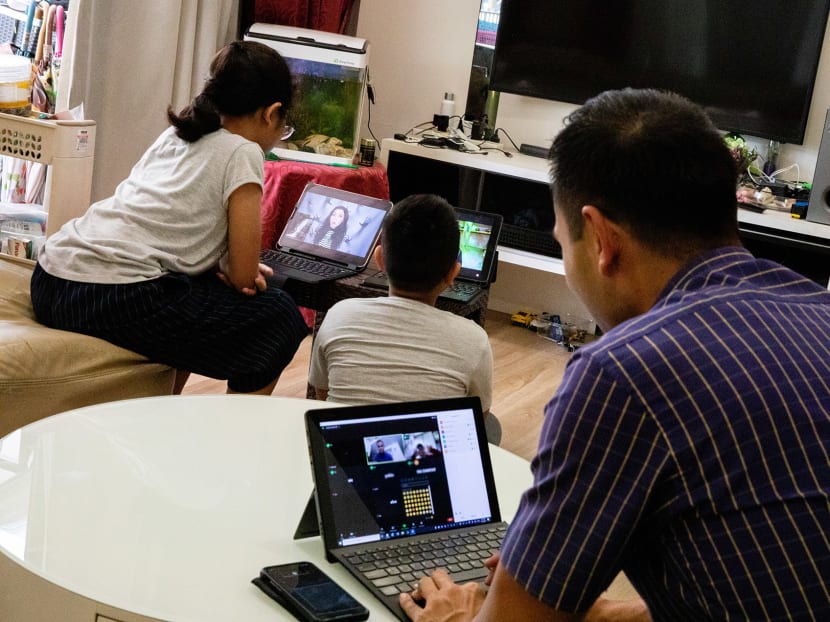
Diminished social skills
On the social front, increasing screen time can lead to overdependence on our devices.
SUTD’s Prof Lim said that overdependence depends on what one is willing to trade off in order to get more screen time.
“If you find that you have become so reliant, fixated on technology that you will trade off going out with your friend or trade off talking to your family member just to remain online, that’s when you should be bothered,” she said. “Obviously, your technology use is impeding your healthy functioning as adults.”
For children, the use of screens can impede their social and emotional development.
Dr Geraldine Tan, a psychologist at The Therapy Room, said many children have “forgotten how to speak on an audio call” due to prolonged screen use.
“Many of them have learnt internet lingo, learnt how to type, they will say they have plenty of friends online… but when they have to speak face to face, you find that they are very inept,” she said.
“It’s a skill that you acquire when you are interacting with another person, and you have to practise and sharpen those skills… (the younger) generation has little opportunity to do that.”
Messes up routine, sleep
Another effect of excessive screen time is the tendency to “zone out”, said the experts.
This can happen when people are scrolling through their social media accounts for new content mindlessly, sometimes for prolonged periods.
Dr Lim, the psychiatrist, said that people zone out because they are conditioned to expect engaging and exciting content at every turn. He likens the phenomenon to gambling.
“In gambling, when you pull a jackpot machine, it is not like you will win everytime, but randomly you win, so our brain is very drawn to random positive reinforcement,” he said.
He added the same can be said for content on social media, where people “don’t know if the next video or post will be interesting or rewarding” and this keeps them scrolling.
“Before you know it, you have spent a lot of time, and it takes up a lot of energy and gets you hooked onto it,” said Dr Lim. “While it may seem to be relaxing, it is actually quite a strain on the mental effort.”
He added that being on the screen for prolonged periods of time also leads to a loss in routine, when every activity involving work, leisure, and social connections is all on the same screen.
Often, this also bleeds into each other — when people regularly reply to messages from friends during work, or watch an episode of a drama during a work lunch break.
“They don’t realise that all this adds on to their stress and anxiety,” said Dr Lim.
The space where a screen is used also matters. For instance, if people keep using their phones while lying in bed, they will associate the bed less as a place of rest but as a space to use these devices.
“The loss of routine disrupts their circadian rhythm (and) it can be quite disruptive to their sleep,” said Dr Lim.
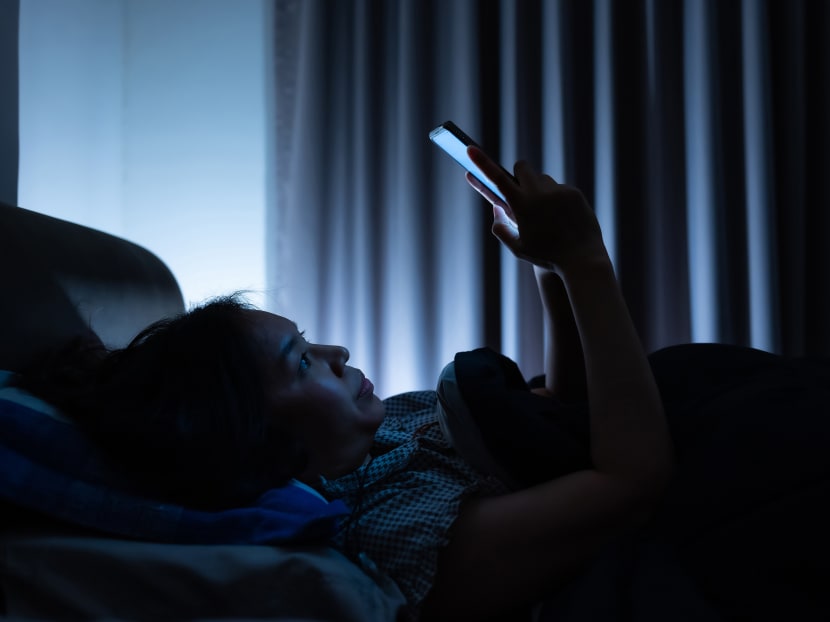
Strain on eyes
Associate Professor Marcus Ang, a senior consultant at the Corneal and External Eye Disease Department of the Singapore National Eye Centre (SNEC), said that common symptoms of excessive screen use include eye strains, teary eyes and dry eyes.
These symptoms normally present themselves to those who are 40 years old and above, and get progressively more severe for those who are older.
He said that before the pandemic, fewer than half of his patients would come to him due to excessive screen use, but now, a “vast majority” of them do so.
“There’s a majority of (patients) who work from home who will report these symptoms, so it’s definitely significant,” said Assoc Prof Ang.
The other concern which he has is the increase in myopia — or short-sightedness — among younger patients and children.
He said that the Myopia Centre at SNEC has been seeing an increase in the number of children seeking treatment for myopia in the past two to three years.
Assoc Prof Ang, who is also the co-clinical director of the Myopia Centre, said that while it is debatable that excessive use of screen time directly causes myopia, it has been proven that the more time spent outdoors, the less likely a person is to develop myopia.
“It’s very complex… a person who does more home-based learning also spends less time outdoors. They don’t take the bus, go to school, go to the playground, so it comes hand in hand,” he said.
SNEC was unable to provide data on the rise in myopia cases during the pandemic.
However, based on latest available statistics, the Ministry of Health website states that in 2019, the prevalence of myopia in Singapore was among the highest in the world, with 65 per cent of children here being myopic at Primary 6, and 83 per cent of young adults having the same problem.
Assoc Prof Ang expects the situation to get worse in the coming years, with up to 80 per cent of children here possibly becoming myopic.
EXPERTS’ PRACTICAL ADVICE
While a digital detox is almost impossible, there are some practical ways to better manage one’s screen time, said the experts interviewed.
Develop better habits
People can change their daily routines and habits around their screens.
For example, Dr Lim said that it is best to “leave all your work in one corner”, and not do work in different spaces in the house such as on the bed.
“If you keep using (your device) in bed, the brain will think this is a work space and it becomes alert,” he said.
Dr Tan said that people should also learn to have off-screen time.
This can be as simple as having a 10-minute walk after work without a phone, or even a lunchtime workout.
For parents, they can help their children by implementing breaks from their digital devices.
Ms Liew said that parents can create a schedule for their children that indicates when they are allowed to use their devices, so they “know what to expect”. For instance, mealtimes can be designated to be phone-free.
Parents should also focus on the content that their children are consuming, and one good way to do so is to watch the programmes with them.
“Notice what the children are doing on the devices... teach them how to use the tools to build connection and creativity, besides just using social media mindlessly,” she said.
Another way to better manage screen time is to embark on hands-on activities and hobbies. These can include sedentary pastimes such as solving jigsaw puzzles and knitting, which can help people relax and destress.
Prof Lim said that while the online environment continuously stimulates the mind, the bombardment of information takes up a lot of mental space.
“The cognitive load is much higher than when you’re knitting and cooking, because for that, you are just focused on one task,” she said.
Even an activity as simple as doing a crossword puzzle can be more beneficial than using a phone, since one is still engaging in some psycho-motor skills when pressing pen to paper.
“People have a bit more sensory feedback when writing, this tactile, sensory feedback is something that many of us are lacking,” Dr Tan said.
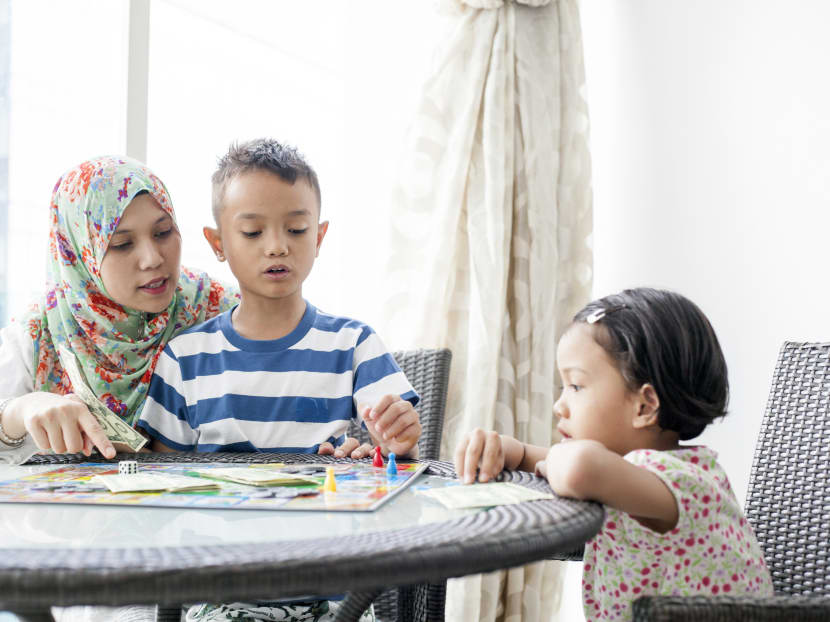
Restoring the personal touch
Having face-to-face interactions is also essential and cannot be fully replaced by the conversations that take place online, said experts.
Dr Lim said that when working from home, a lot of nuances are lost in online conversations.
“For example, they don’t get little reassurances like the pat on the shoulder from a colleague… they lose the personal touch and people find it a bit disconcerting,” he said. “People don’t realise how much they need reassurances.”
He added that one-on-one meet-ups should also be encouraged, even for children.
“We shouldn’t be too paranoid about Covid-19 and learn to live with it,” he said. “If your child would like to have friends visit or go out for a walk in an open space, we should encourage that.”
Taking better care of our eyes
To prevent symptoms such as dry eyes and blurry vision, Assoc Prof Ang said that those who are working for long hours in front of a screen should adopt the 20-20-20 rule, where for every 20 minutes, they take 20-second breaks to look at something 20 feet (or about 6m) away.
This will help reduce the strain of staring at a screen less than a metre away.
To prevent myopia, he said that outdoor time is very important, especially for children.
Parents can aim to spend one to two hours a day outdoors with their children to walk around parks or cycle, for example. They should also take their children to an eye doctor for regular checks.
It is crucial to start early if parents want to prevent the onset of myopia.
“Myopia is irreversible… If a child becomes more myopic during this pandemic, it may affect them for the rest of their lives,” said Assoc Prof Ang.








